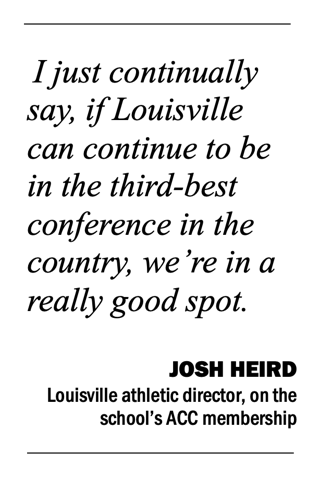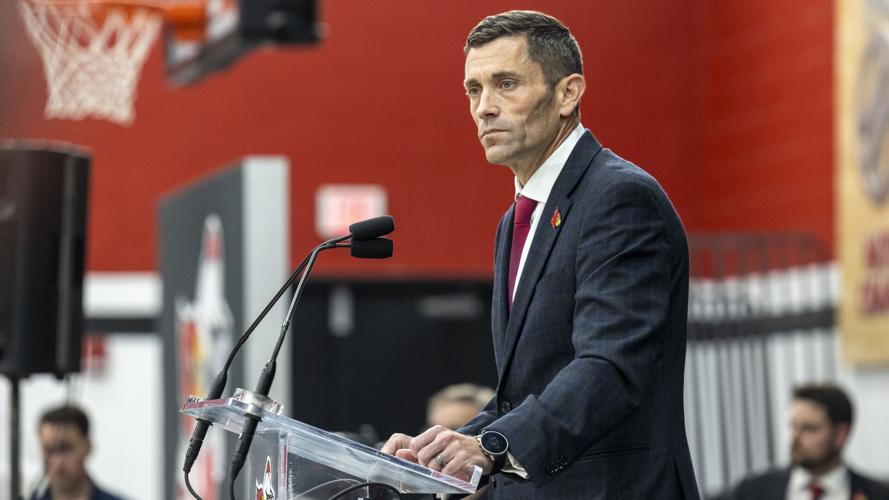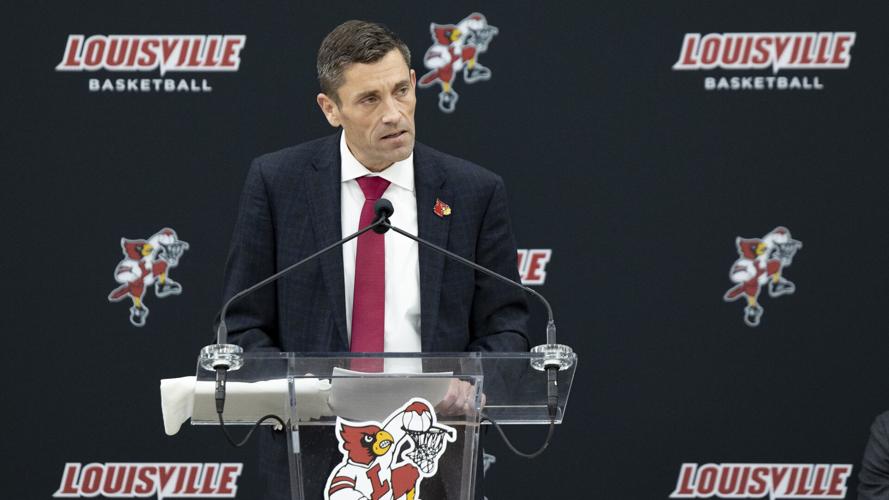LOUISVILLE, Ky. (WDRB) – The Atlantic Coast Conference is a league beset with conflict, both outside and in. It exists in a college sports landscape in which its top rivals, the Southeastern and Big Ten conferences, have leaped ahead with high-profile expansion moves and high-dollar media rights deals.
Two of its most visible members, Florida State and Clemson, have filed lawsuits to try to exit the league, citing higher revenue opportunities in other conferences, namely the SEC.
Florida State was left out of the four-team College Football Playoff last season after an injury to its starting quarterback, despite going undefeated.
Just Louisville’s luck. It moves into an old-money, established neighborhood just as the whole thing falls apart. Except that it hasn’t, if you listen to Louisville athletic director Josh Heird, who spoke a bit about the ACC’s current challenges after attending the league’s meetings in Amelia Island, Fla.
"I'm bullish on the ACC and you may say, ‘Well, don’t you have to be?’ And yeah, maybe this is born out of necessity a little bit. But I don’t think I’m being naïve," Heird said. "I think the ACC is in a really strong position. And I just continually say, if Louisville can continue to be in the third-best conference in the country, we’re in a really good spot."

To understand that statement, some context, perhaps, is necessary. For Louisville, conference consternation is nothing new. It has been a way of life for more than three decades – most of that spent on the outside looking in at the NCAA’s power structure.
When Louisville was in the Metro Conference, it saw Georgia Tech and Florida State bolt for the ACC. South Carolina left for the SEC. The Metro simply kicked out Virginia Tech and Virginia Commonwealth before it dissolved to form the basis of Conference USA. Virginia Tech sued.
Tired of Louisville trying to stand in the way of its football expansion plans, Conference USA sued Louisville in 1996. U of L finally relented to allow Army and East Carolina to come into the league, and the suit was dropped.
Louisville finally made it into the Big East, only to see that league raided. Eventually, the football-playing side of the Big East disintegrated into something called the American Athletic Conference. And once Maryland bolted the ACC for the Big Ten, it took a heroic effort on the part of then-athletics director Tom Jurich to outflank Connecticut for the last spot in the ACC.
Once there, Louisville figured its conference problems were over. It should have known better. Further realignment threatens a stranglehold the league has appeared to have on its current members’ media rights deals, and the fracturing is public. Even conference stalwarts North Carolina and Virginia have explored other options.
Still, the ACC’s current struggles are nothing compared with where the school came from.
"I think at times, we, fans, lose sight of where the ACC is really," Heird said. "There's a lot of athletic departments that would pay, I mean handsomely, to be in the ACC. As I always I always kind of refer to it, we live in a pretty good neighborhood. And I think sometimes we all get used to driving into our neighborhood, right? And then we go to another neighborhood that isn't as nice and we realize, ‘We live in a really nice neighborhood.’ And that's what I don't want us, our fans, other members of the ACC, to forget. In the ACC, we continue to win more national championships than any other conference. Academically, we continue to be second to none. And you can say those things don’t matter. They do matter."
For the time being, anyway, Louisville appears to have a home, and a better one than it has ever had. But being prepared to find a new one is nothing new. When it went into Conference USA, then-president Donald Swain said openly that if Louisville could gain entry into a more-established league, it would. He predicted future realignment and other opportunities. He was a bit ahead of his time in that.
In a discussion about coming financial changes as part of the House v. NCAA settlement, Heird touched on the ACC in some other ways. Below are a few edited responses to ACC questions.

Josh Heird answers questions after introducing Pat Kelsey as Louisville's new basketball coach.
CRAWFORD: A big part of your approach to administering player payments and other guidelines in response to House will be what rules and approaches the ACC sets up. Do you have any idea how those will go?
HEIRD: I think they're doing a lot of the same things of like, "What can we tackle?" As far as roster limits and distribution of funds and all those things. What's the best way to approach it? . . . The ACC is taking a proactive approach to try to get answers to questions and to say, ‘You know, we can we can tackle this one, which will give us some answers to that one.’ And you keep the ball rolling until we have some real answers as to how we're going to move forward here. And I do feel confident and comfortable there. I think we've got a room full of ADs that I think are similar to me, that want to want to be creative as far as how we tackle this thing. And that's what we're going to try to do."
CRAWFORD: In a quirk of this settlement, ACC schools will shoulder more of a burden for damages, "back-payments" to former athletes, than say the SEC, because the fund for repayments is based on NCAA Tournament credits, not football revenue. How does that sit with you?
HEIRD: That's one, you know it's funny, I kind of caught myself getting upset. And all the smaller school Group of 5 teams are complaining about the amount that they're paying, and saying their percentage is not what they think it should be. But it's like, guys, you wouldn't have any of this basketball revenue, if it wasn't for the NCAA Tournament that, for all intents and purposes, is created by all the schools in the Power 5. And so I say, look, we could sit here and point fingers, and who knows what, or we could just say, it is what it is. Let's focus on the future. And that's where I'm at. How do we move forward? How do we create stability within this industry and stop getting sued six ways to Sunday? That’s where I want to try to take this thing.
CRAWFORD: Are you confident the ACC can remain competitive with the landscape heading the direction it’s headed?
HEIRD: I put us up there with the best in the country. I’m on the women’s basketball selection committee. There wasn’t another conference – I guess we had us with eight in, correct? And the discussion around the ninth team was an ACC school. Top to bottom, I think the ACC is as strong as anybody in women's basketball, men's basketball. I don't know why the narrative during the regular season is the ACC is not as good. But year in and year out, it gets proven in the postseason and the NCAA tournament that ACC is the best conference. In football, we've got to continue to invest and build some depth there. And if we do that, I think we're going to be in a really good spot. And I may go deeper into the weeds here than you want but, you know, are teams willing to play? We’ve got home-and-homes with Texas A&M and Georgia. We want to play those games. We want to say we can beat SEC schools, and I think other ACC schools are saying the same things. We’ll play those teams. So, let’s step up and show we can compete with these guys. Last time I checked, it was a Big Ten school that paid us to get out of a game, not vice-versa right?

Louisville athletics director Josh Heird speaks during the introductory news conference for basketball coach Pat Kelsey.
CRAWFORD: You’ve talked a little about the league. Just from a high level look, what’s on the horizon for your teams this season?
HEIRD: I have a lot of optimism. And you may say, "Well, don’t you have to?" Yeah. But as I tell people, I’m an optimistic realist. I wouldn't have told you (a couple of weeks ago), we were in the baseball tournament. I would have said, "You know, I'm not sure we're going to get there." I say all that from a context standpoint.
I’m excited about football. I don't have to tell people this, Jeff Brohm is a hell of a football coach. He is. He is very good at putting a roster together. And that's why I go back to like, the NIL doesn't work unless you have really good leadership. That's what I keep telling people. And you know, Pat Kelsey, and Jeff Walz, and Dani Busboom Kelly, they have all assembled really good rosters.
I think the roster that Pat has put together is, on paper, really good and it fits together really nicely. As I joke with him, now you just have to go win games. But there’s optimism that this guy's won games wherever he's been. I feel like the hardest part of that equation was, could he put a roster together? I mean, literally turn over an entire roster, everybody. And I think his success is built around the culture that he creates in his locker room.
Jeff, I think is a lot of the same. Same way, you know, Jeff Walz, both of them. Dani is the same way. I remember telling Dani, after they lost in the Final Four, I was in the locker room with her with her team. And I said, you guys have, to me, one of the best cultures in all of sports. And I got to experience, in my mind, the best one that there was that with Jay Wright. And this is very similar, where it’s focused on the team, focused on each of our responsibilities to the team. When you can do that, when you can create a culture like that it's harder now than ever with NIL, and what am I getting paid, and what’s the player across the locker room getting paid? Why are they getting paid more? So, you've got to have somebody who can squash all that and say, guys, we're here, and everybody does better when we win games.
CRAWFORD: You talk about revenue challenges. I would anticipate that you’re expecting crowds to return in some fashion for men’s basketball?
HEIRD: As good of a coach as Pat is, he’s going to market and promote. And as you know, this fan base needed some of that. And I’ll just tell you, Pat’s not going to say, "Let’s just schedule six winnable games." He understands what the fans want to see. So we’re starting to get the schedule together and I think in a week or two we’ll have it nailed down so we can get it out.
Copyright 2024 WDRB Media. All Rights Reserved.
















